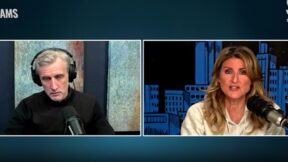Comedian Chris Gethard Talks To Mediaite About Finding The Future Of Entertainment Via Public Access TV
Mediaite: I was telling Dave last week, what I find so interesting from when I first started watching, and it just feels so — and I also felt that way about the live show — is that you feel in a way that..this is hard to describe, but in a way like since everything is so splintered now, there are a thousand channels, like everything’s cult, so that nothing’s cult? So then just watching — The first episode I watched I think was three. Because I was having a hard time finding the full episodes of one and two —
Gethard: Because the stream fucked up. So people are going to be able to get those podcasts.
Mediaite: Oh are they online yet?
Gethard: No we have tapes of them, but we basically weren’t… because MNM wasn’t, it’s kind of like the wild west, and they said they were streaming, they said they bought all this server space, and we kind of immediately overloaded it.
Mediaite: Wow. But the instant I turn on episode three, and you start explaining Random Jean’s backstory, like it just feels instantly like “Oh, I’m part of an inside club, I’m part of this clubhouse, I’m part of this cool world,” that I feel is kind of a throwback to these more organically built communities than you have now, with your YouTube —
Gethard: Yeah.
Mediaite: I don’t know. Just the fact that it is on TV, and it isn’t just something someone filmed and put on YouTube and got a million hits.
Gethard: Right. Well I think it’s interesting. I think with public access, it is TV and there is a certain — we have to have a certain level of responsibility there. Like, we can’t blow it off. You’re given thirteen week cycles and you have to fill those thirteen hours.
Mediaite: You can’t send that Tweet out to fans being like “Guys, sorry, we got busy this week.”
Gethard: Yeah, we can’t skip it like we could a podcast. There’s a certain level of responsibility and I think being on public access that there’s just like a tiny shred of legitimacy that comes with being broadcast on TV that you don’t get on the internet in most cases. But not nearly enough legitimacy that is doesn’t feel like a completely homemade thing, you know. So it sort of ties our hands.
Mediaite: There is something that I feel doesn’t exist anymore. In a great way you have the democratization of, “Anyone can do a podcast, anyone can have a show,” but only the devoted (which sometimes means crazy) are going to do public access. For example, I was once watching Brooklyn public access with some friends and really late at night there was this panel show about male strippers. It was just them talking about their life. And then this one guy did his routine which involved him taking a giant ball of wax, cutting a hole into it, fastening it onto his penis, and lighting the wax on fire while he dances.
Gethard: That’s nuts.
Mediaite: It was insane! But, at the same time, you have to put some effort to get a public access show.
Gethard: Yeah, you do. And a lot of it is, you get a lot of conspiracy theory guys. We’re supposed to work in MNM’s big studio and then weeks two, three, and six they switched us to the small studio because they double booked our prep time. So we couldn’t do our show that had musical guests and audience. You just don’t have time. Week three, I was all upset. I showed up and asked who’s in the big studio and there was just like a bunch of people bellydancing. They just wanted to belly dance on my TV and I was like, “That’s awesome.”
That’s one thing I love about it. Everybody there — not everybody, there’s some crazy people — but there’s a lot of people that are just like, “I just want a TV show, man.” I don’t really know, I think there’s a lot of people who are like “this is how I get to be on TV” and then I think I might be a little different in the sense that I have been on TV. Not as much as a lot of people. I hope that doesn’t come off as me saying I’m a big deal but I have been on TV and I could be on TV in other ways but this is how I’m choosing to be on TV. So it’s kinda like I gotta put my money where my mouth is and make it happen. You watch any public access TV and that’s someone’s vision and for the level I’m at with my career I think it’s the only option I have that will let me put my vision out there in any way. Could be interesting, think it’ll be interesting, it has been so far.
Mediaite: The show airs live so there is a feeling that it inspires in the audience of “Let’s gather together and watch this” that doesn’t exist in podcasts like it does in TV.
Gethard: Yeah, I would like to think that we’re doing a good job of rewarding that. Stay at home, watch and call. There’s a guy that calls — he’s called like three or four weeks — and he just pretends to be Jack Klugman. I don’t like getting calls as characters because I’d rather just talk to people but people think it’s funny. This guy calls up, every week he calls up and he’s like “Hey, it’s Jack Klugman” and I’m say “Hey, you’re the guy who pretends he’s Jack Klugman” and he’s says “I don’t know what you’re talking about,” but anyways it’s fun.
We’ve had a running thing of who’s calling from farthest away. We started getting calls and, first, they were all from the tri-state area and, a couple weeks ago, we got a call from Kansas which we were psyched about and, this past week, somebody called watching on the Internet in Oregon. It’s cool. But we’re able to point that out, you’re now the guy who has called from farthest away, you’re a part of things and that’s your little badge of honor that you have as a participant in this show. If you call in, you are a participant. We don’t control that. That’s something I’ve always liked playing with.
Part of why the Diddy thing worked in the stage show I think was because, if it was just me trying to do it, it wouldn’t have worked. I had to rally all of these people online to contact him or else he never would have noticed. We did this cross country tour where the idea was we won’t plan the route. If you tell us to go somewhere on Twitter, that’s where we’ll point the RV and go. And that one was kind of a massive undertaking and I don’t know how it could have gone a lot smoother.
“Really what the show should be is sort of like a community center for this fucked up community of nerds with nothing better to do. If you have nothing better to do on a Wednesday from 11-midnight eastern time, then you should be a part of this community, which I think is always what the internet has been great at.”
Mediaite: It looked like it almost killed you guys.
Gethard: It did. That’s another reason why I wanted to switch formats because putting all that money and effort and time into a project like that that was largely via a stage so there’s just such a massive amount of pressure on it. Whereas a TV show feels like the next step in that progress but also something that just allows us to reach out for that different direction.
I’m very big in the idea of “You tell us what to do and we do it.” It’s not us shoving ideas down your throat. It’s not a TV show where you watch it and, if you like it you like, good, and, if you don’t, fuck off. If you don’t like it, call up and let us know and we’ll get on a fight on the air and you’ll probably convince me and whatever you don’t like I’ll probably try to change it. I think it was week two or three, the director of the show, JD Amato, had been like, “You know, you’re getting angry at people on the air and it’s coming off kind of really negative and off-putting” and I was like, “I don’t know, I think it’s funny.” And so, on the air, I said “You know, my director’s giving me this note that I’m too angry” and then all these people starting calling up being saying, “Yeah, you’re kind of a jerk, man. It’s kind of off-putting.” So I started working on it because viewers actually called up and gave me notes on the air on my performance. So, I just love that side of it. I just love the social media side of it.
>>>>NEXT PAGE: Social media and the future of television.
New: The Mediaite One-Sheet "Newsletter of Newsletters"
Your daily summary and analysis of what the many, many media newsletters are saying and reporting. Subscribe now!






Comments
↓ Scroll down for comments ↓